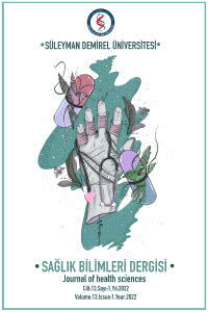Yoğun Bakım Ünitesinde Donör Bakımı
-
Donor Care in Intensive Care Unit
-,
___
- Moseley JI, Molinari GF, Walker AE. Respirator brain. Report of a survey and review of current concepts. Arch Pathol Lab Med. 1976; 100: 61-64.
- Halevy A, Brody B. Brain death: reconciling definitions, criteria, and tests. Ann Intern Med. 1993; 119: 519-525.
- Smith M. Physiologic changes during brain stem death- -lessons for management of the organ donor. J Heart Lung Transplant. 2004; 23(9 Suppl): S217-22.
- Tuttle-Newhall JE, Collins BH, Kuo PC, Schoeder R. Organ donation and treatment of the multi-organ donor. Curr Probl Surg. 2003; 40: 266-310.
- Bratton SL, Davis RL. Acute lung injury in isolated traumatic brain injury. Neurosurgery. 1997; 40: 707-712.
- Wood KE, Becker BN, McCartney JG, D’Alessandro AM, Coursin DB. Care of the potential organ donor. N Engl J Med. 2004; 351: 2730-2739.
- Kutsogiannis DJ, Pagliarello G, Doig C, Ross H, Shemie SD. Medical management to optimize donor organ potential: review of the literature. Can J Anaesth. 2006; 53: 820-830.
- Salim A, Velmahos GC, Brown C, Belzberg H, Demetriades D. Aggressive organ donor management significantly increases the number of organs available for transplantation. J Trauma. 2005; 58: 991-994.
- Salim A, Martin M, Brown C, Inaba K, Roth B, Hadjizacharia P, Mascarenhas A, Rhee P, Demetriades D. Using thyroid hormone in brain-dead donors to maximize the number of organs available for transplantation. Clin Transplant. 2007; 21: 405-409.
- ISSN: 2146-247X
- Yayın Aralığı: Yılda 3 Sayı
- Başlangıç: 2010
- Yayıncı: Zehra ÜSTÜN
Aile Hekimlerinin Kanıta Dayalı Tıp Uygulamalarını Kullanım Durumları ve Bilgi Arama Davranışları
MELTEM SAYGILI, SIDIKA KAYA, Cuma SONĞUR, ÖZLEM ÖZER
Alkolik olmayan farelerde karaciğer yağlanmasında visfatin ve interlökin-6’nın etkisinin incelenmesi
Ortodontide Risk Faktörleri ve Yasal Yükümlülükler
Sila Caglayan, Burcu Baloş Tuncer
İkinci Trimester Gebeliklerde Fetal Nazal Kemik Uzunluğunun Değerlendirilmesi
Pelin DİZEN, NEŞE ASAL, Mahmut KACAR, Ömer YILMAZ, ELİF NİSA ÜNLÜ, Seyit Ali KÖSE, Pınar KOŞAR
Ortodontide risk faktörleri ve hekim sorumluluğu
Sıla ÇAĞLAYAN, Burcu Baloş TUNCER
Eyüp BÜYÜKKAYA, Esra KARAKAS, Bilge BÜLBÜL ŞEN, Mehmet Fatih KARAKAŞ
Yoğun Bakım Ünitesinde Donör Bakımı
Yüzey Dehidratasyonun Self Etch Adeziv Sistemlerin Mikrosızıntı Skorlarına Etkisi
Neslihan Tekçe, Alev ÖZSOY, Harika Gözükara Bağ, Harika Gözükara bağ
